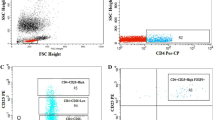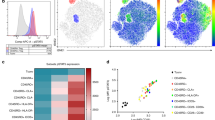Abstract
Acute lymphoblastic leukemia (ALL) cells are particularly poor at generating anti-leukemia immunity, despite residing in lymphoid organs. To assess a potential role of dendritic cells (DC) in poor anti-leukemia immunity, we analyzed peripheral blood DC in 55 pediatric ALL patients at the time of initial diagnosis and 19 age-matched healthy controls. Dendritic cells were identified by their expression of HLA-DR, lack of B, T, NK, and monocyte markers, and expression of CD11c (myeloid DC(mDC)) or BDCA-2 (plasmacytoid DC(pDC)) using flow cytometry. We found that in children with B-lineage ALL, numbers of both mDC and pDC were significantly reduced (P=0.0001). In contrast, T-lineage ALL patients showed normal pDC and significantly elevated mDC (P=0.003) levels, with normal expression of HLA-DR and co-stimulatory molecules. A decrease in DC could not be explained by general impairment of myelopoiesis, as we could not demonstrate a correlation of DC numbers with granulocyte/monocyte numbers in patients with B-lineage ALL. However, aberrant expression of myeloid surface markers on leukemic blasts was frequent in patients lacking myeloid DC indicating a potential block of DC differentiation. Thus, depletion of DC in B-lineage ALL patients may contribute to poor anti-leukemia immune responses.
This is a preview of subscription content, access via your institution
Access options
Subscribe to this journal
Receive 12 print issues and online access
$259.00 per year
only $21.58 per issue
Buy this article
- Purchase on Springer Link
- Instant access to full article PDF
Prices may be subject to local taxes which are calculated during checkout



Similar content being viewed by others
References
Schrappe M, Camitta B, Pui CH, Eden T, Gaynon P, Gustafsson G et al. Long-term results of large prospective trials in childhood acute lymphoblastic leukemia. Leukemia 2000; 14: 2193–2194.
Schrappe M, Reiter A, Ludwig WD, Harbott J, Zimmermann M, Hiddemann W et al. Improved outcome in childhood acute lymphoblastic leukemia despite reduced use of anthracyclines and cranial radiotherapy: results of trial ALL-BFM 90. German–Austrian–Swiss ALL-BFM Study Group. Blood 2000; 95: 3310–3322.
LeClerc JM, Billett AL, Gelber RD, Dalton V, Tarbell N, Lipton JM et al. Treatment of childhood acute lymphoblastic leukemia: results of Dana-Farber ALL Consortium Protocol 87-01. J Clin Oncol 2002; 20: 237–246.
Woolfrey AE, Anasetti C, Storer B, Doney K, Milner LA, Sievers EL et al. Factors associated with outcome after unrelated marrow transplantation for treatment of acute lymphoblastic leukemia in children. Blood 2002; 99: 2002–2008.
Gustafsson Jernberg A, Remberger M, Ringden O, Winiarski J . Graft-versus-leukaemia effect in children: chronic GVHD has a significant impact on relapse and survival. Bone Marrow Transplant 2003; 31: 175–181.
Cardoso AA, Seamon MJ, Afonso HM, Ghia P, Boussiotis VA, Freeman GJ et al. Ex vivo generation of human anti-pre-B leukemia-specific autologous cytolytic T cells. Blood 1997; 90: 549–561.
Cardoso AA, Veiga JP, Ghia P, Afonso HM, Haining WN, Sallan SE et al. Adoptive T-cell therapy for B-cell acute lymphoblastic leukemia: preclinical studies. Blood 1999; 94: 3531–3540.
Stripecke R, Skelton DC, Gruber T, Afar D, Pattengale PK, Witte ON et al. Immune response to Philadelphia chromosome-positive acute lymphoblastic leukemia induced by expression of CD80, interleukin 2, and granulocyte–macrophage colony-stimulating factor. Hum Gene Ther 1998; 9: 2049–2062.
Auffermann-Gretzinger S, Keeffe EB, Levy S . Impaired dendritic cell maturation in patients with chronic, but not resolved, hepatitis C virus infection. Blood 2001; 97: 3171–3176.
Chehimi J, Campbell DE, Azzoni L, Bacheller D, Papasavvas E, Jerandi G et al. Persistent decreases in blood plasmacytoid dendritic cell number and function despite effective highly active antiretroviral therapy and increased blood myeloid dendritic cells in HIV-infected individuals. J Immunol 2002; 168: 4796–4801.
Mohty M, Jarrossay D, Lafage-Pochitaloff M, Zandotti C, Briere F, de Lamballeri XN et al. Circulating blood dendritic cells from myeloid leukemia patients display quantitative and cytogenetic abnormalities as well as functional impairment. Blood 2001; 98: 3750–3756.
Mohty M, Isnardon D, Vey N, Briere F, Blaise D, Olive D et al. Low blood dendritic cells in chronic myeloid leukaemia patients correlates with loss of CD34+/CD38− primitive haematopoietic progenitors. Br J Haematol 2002; 119: 115–118.
Bourguin-Plonquet A, Rouard H, Roudot-Thoraval F, Bellanger C, Marquet J, Delfau-Larue MH et al. Severe decrease in peripheral blood dendritic cells in hairy cell leukaemia. Br J Haematol 2002; 116: 595–597.
Mami NB, Mohty M, Chambost H, Gaugler B, Olive D . Blood dendritic cells in patients with acute lymphoblastic leukaemia. Br J Haematol 2004; 126: 77–80.
Vakkila J, Thomson AW, Vettenranta K, Sariola H, Saarinen-Pihkala UM . Dendritic cell subsets in childhood and in children with cancer: relation to age and disease prognosis. Clin Exp Immunol 2004; 135: 455–461.
Teig N, Moses D, Gieseler S, Schauer U . Age-related changes in human blood dendritic cell subpopulations. Scand J Immunol 2002; 55: 453–457.
Dzionek A, Fuchs A, Schmidt P, Cremer S, Zysk M, Miltenyi S et al. BDCA-2, BDCA-3, and BDCA-4: three markers for distinct subsets of dendritic cells in human peripheral blood. J Immunol 2000; 165: 6037–6046.
Gabrilovich D . Mechanisms and functional significance of tumour-induced dendritic-cell defects. Nat Rev Immunol 2004; 4: 941–952.
Troy AJ, Summers KL, Davidson PJ, Atkinson CH, Hart DN . Minimal recruitment and activation of dendritic cells within renal cell carcinoma. Clin Cancer Res 1998; 4: 585–593.
Nestle FO, Burg G, Fah J, Wrone-Smith T, Nickoloff BJ . Human sunlight-induced basal-cell-carcinoma-associated dendritic cells are deficient in T cell co-stimulatory molecules and are impaired as antigen-presenting cells. Am J Pathol 1997; 150: 641–651.
Gabrilovich DI, Corak J, Ciernik IF, Kavanaugh D, Carbone DP . Decreased antigen presentation by dendritic cells in patients with breast cancer. Clin Cancer Res 1997; 3: 483–490.
Cloppenborg T, Stanulla M, Zimmermann M, Schrappe M, Welte K, Klein C . Immunosurveillance of childhood ALL: polymorphic interferon-gamma alleles are associated with age at diagnosis and clinical risk groups. Leukemia 2005; 19: 44–48.
Lauten M, Matthias T, Stanulla M, Beger C, Welte K, Schrappe M . Association of initial response to prednisone treatment in childhood acute lymphoblastic leukaemia and polymorphisms within the tumour necrosis factor and the interleukin-10 genes. Leukemia 2002; 16: 1437–1442.
Acknowledgements
We are indebted to our patients and healthy blood donors, their parents and physicians for the commitment to this study. We thank A Frank-Hoppe for excellent study support. This work was supported by a grant of the Kind-Philipp-Stiftung für Leukämieforschung (BM, DM) and Hannover Medical School (HiLF).
Author information
Authors and Affiliations
Corresponding author
Rights and permissions
About this article
Cite this article
Maecker, B., Mougiakakos, D., Zimmermann, M. et al. Dendritic cell deficiencies in pediatric acute lymphoblastic leukemia patients. Leukemia 20, 645–649 (2006). https://doi.org/10.1038/sj.leu.2404146
Received:
Accepted:
Published:
Issue Date:
DOI: https://doi.org/10.1038/sj.leu.2404146
Keywords
This article is cited by
-
Early T-cell precursor lymphoblastic leukemia accompanied by prominent blastic plasmacytoid dendritic cell proliferation mimicking blastic plasmacytoid dendritic cell neoplasm: an exceptional case report and literature review
Journal of Cancer Research and Clinical Oncology (2022)
-
Absolute lymphocyte counts at end of induction correlate with distinct immune cell compartments in pediatric B cell precursor acute lymphoblastic leukemia
Cancer Immunology, Immunotherapy (2018)
-
Hepatic carcinoma-associated fibroblasts induce IDO-producing regulatory dendritic cells through IL-6-mediated STAT3 activation
Oncogenesis (2016)
-
Dendritic cell reconstitution is associated with relapse-free survival and acute GVHD severity in children after allogeneic stem cell transplantation
Bone Marrow Transplantation (2015)
-
slanDCs selectively accumulate in carcinoma-draining lymph nodes and marginate metastatic cells
Nature Communications (2014)



